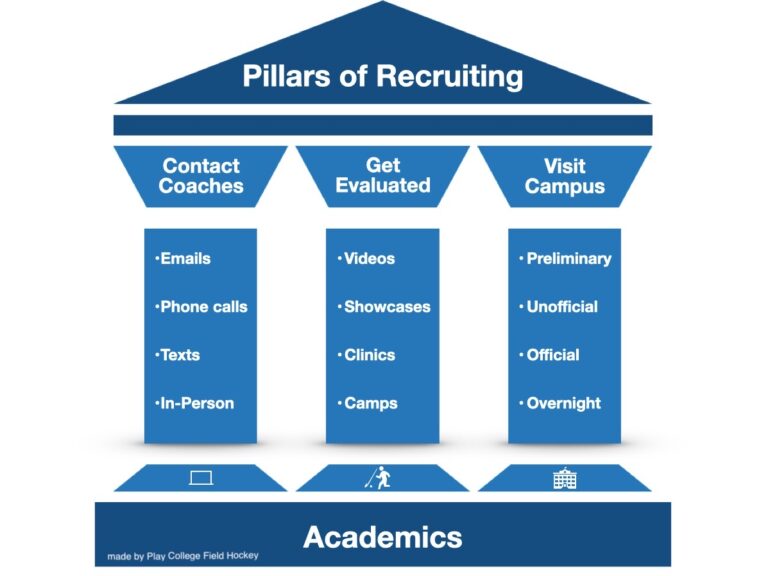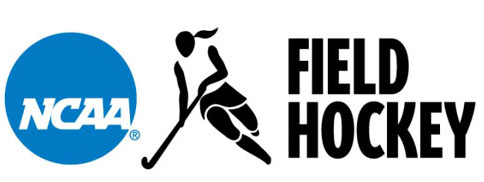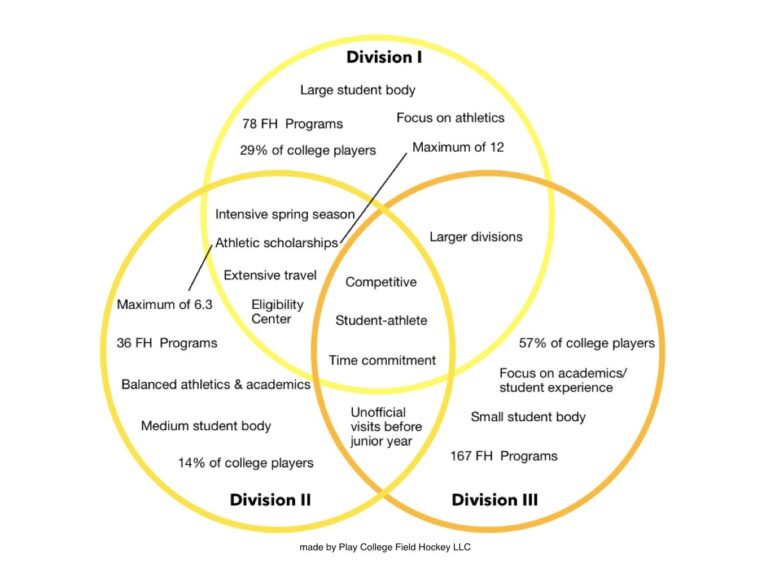Let's get you recruited
So you want to play college field hockey? Well, congrats on wanting to play at the next level, but this is just the beginning of a long road. Have no fear, here is a guide to help you get started with the basics of recruiting created by Phoebe Hopkins, former collegiate player and coach. She owns and operates Play College Field Hockey and created this blog post to guide aspiring collegiate field hockey players at all levels. Visit her website for more info: http://www.playcollegefieldhockey.com

the pillars of recruiting
Step 1: Contact Coaches
Communicating with college coaches is the first step to successful recruitment. Use emails, phone calls, and even campus visits to build relationships with coaching- let them know who you are and how you can benefit the program. This is communication is on-going and requires commitment, consistency, and good communication skills.
Step 2: Get Evaluated
College coaches are always on the recruiting trail. They attend numerous events each year in order to find players who will be a good fit for their program. There are three major steps you can take in order to get evaluated— I recommend you do all three:
- 1) Attend large recruiting events and invite coaches to come see you play.
- 2) Attend the college camps and clinics of schools that you are interested in.
- 3) Create a field hockey highlight video and send it out to coaches.
Step 3: Visit Campus
Stepping foot on campus is a great way to figure out if a school is a good fit for you. Campus visits also provide opportunities to meet with the coaching staff, get to know the current players, and get a feel of what the school and community has to offer. Prospective student-athletes often make more than 3 visits to the school they end up committing to. Whether you are on a non-athletic visit, attending a camp/clinic, or are invited on an unofficial or official visit, every time you are on campus is a crucial moment in your recruiting process.

understanding the ncaa
The National Collegiate Athletic Association (NCAA) is composed of three Divisions: Division I, Division II, and Division III. Having a general sense of which Division is right for you is crucial in your recruiting process. Choosing a school is a two way street because as coaches are searching for the best players for the team, you also need to find a school and program that best suits you.
Remember that you are a student-athlete, so make sure your school has majors, minors, and other programs that you want to pursue. Make a list of schools you like academically, and you may notice that your list of colleges and universities may be composed of schools in each division. No matter which division best suits you, you will be expected to make a serious time commitment, act professionally, and always compete at your best.
Division I (78 programs)
- Large student-body population
- Focus on athletics (offers highest level of play)
- Requires the largest time commitment from the student-athlete (including travel)
- Offers largest athletic scholarships (a fully funded program has 12 scholarships)
- Athletes must meet NCAA academic eligibility requirements
- Most competitive rosters
Division II (36 Programs)
- Medium sized student-body population
- Aims to balance Athletics and Academics
- Smallest Division for NCAA Field Hockey
- Requires large time commitment from student athlete (including travel)
- Offers small to medium athletic scholarships (a fully funded program has 6.3 scholarships)
- Athletes must meet NCAA academic eligibility requirements
- Competitive rosters
Division III (167 programs)
- Smallest student-body population
- Focus on Academics with Athletes crucial to student experience
- Largest Division for NCAA Field Hockey
- Still requires large time commitment, however there is the possibility of playing more than one sport (often less travel)
- Cannot offer athletic scholarships
- Athletes must meet schools’ academic standards
- Competitive rosters

four year recruiting timeline
Freshman Year of High school
- Compile a list of schools that interest you (aim for a minimum of 30)
- Play club and HS field hockey
- Get feedback from your coaches and focus on improving your game
- Begin contacting college coaches — you must get on their radar
- Consider attending college camps, clinics, as well as national and local recruiting events
- Maintain a strong academic record
Sophomore Year of High School
- Continue to research colleges and universities
- Register with the NCAA eligibility center
- Continue to stay in contact with coaches via email — be sure to fill out The Recruiting Questionnaire for each school on your list
- Create a recruiting video to send to coaches — film your games or get the video editing services from events you attend
- Continue to attend college camps and clinics
- Attend national and local recruiting events — ask college coaches to come see you play at each event
- Continue to maintain good grades and begin SAT/ACT test prep
Junior Year of High School
- Begin to narrow your list and stay in contact with all schools and coaches that you remain interested in — always respond to every coach in a timely and professional manner
- Make sure your top choice schools know where they stand
- Begin to make official and unofficial campus visits (do overnights when you can) — always arrange to meet with the coaching staff
- Continue to attend college camps and clinics
- Attend national and local recruiting events — ask college coaches to come see you play at each event
- Ask coaches about their recruiting timeline and where you stand on their list
- Continue to maintain good grades and take SAT/ACT tests
- Depending on the school/Division you may aim to make a commitment in the summer before your senior year
Senior Year of High School
- Make sure your top choice schools know where they stand
- Continue to make visits and do overnights
- Attend camps and clinics
- Apply to colleges and universities– always let the coaches know when your application has been submitted
- Commit to a school and keep your future coach updated on your hockey schedule and achievements
This article outlines the basics. Visit Phoebe for more information:
http://www.playcollegefieldhockey.com

